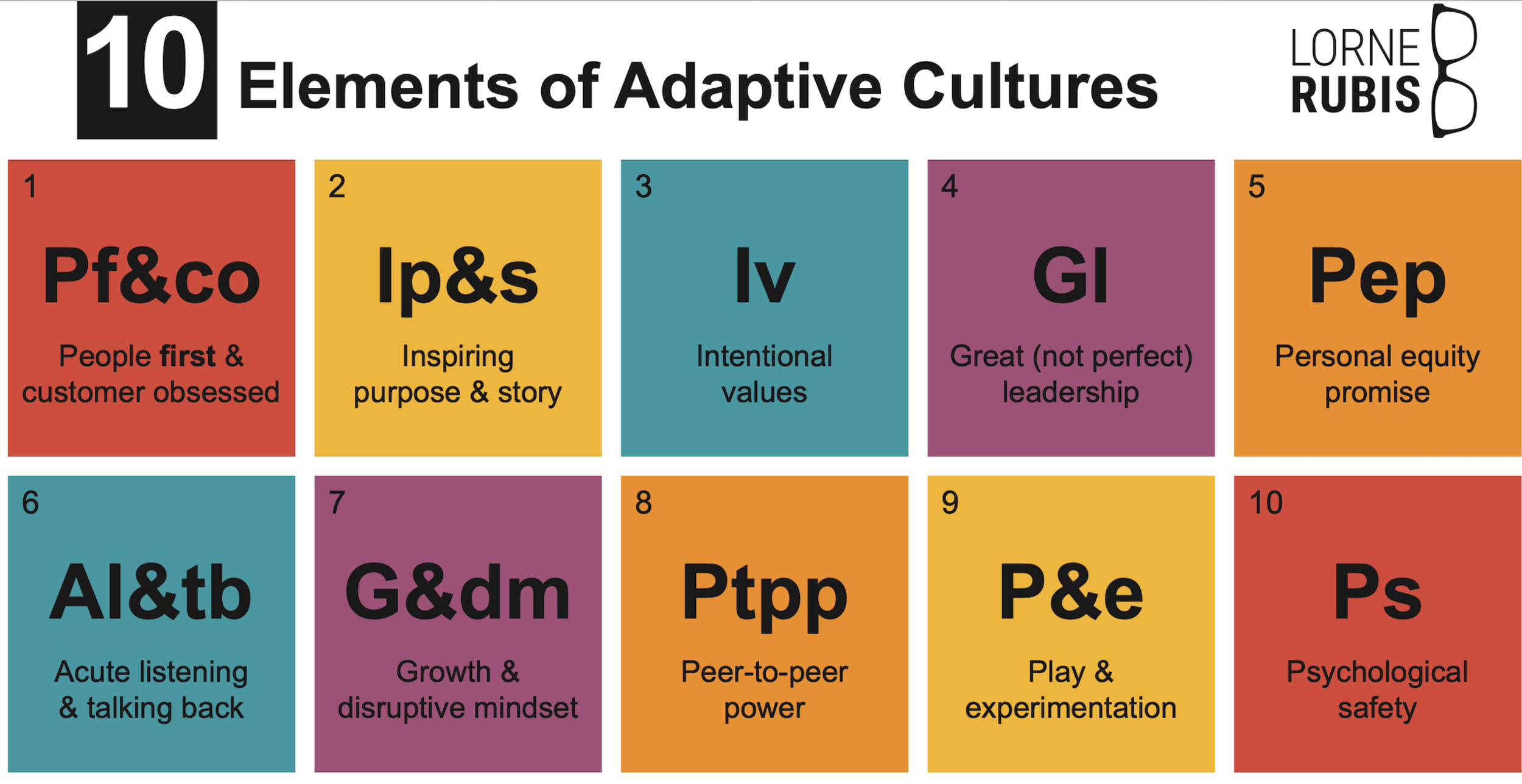Examples of the 10 Elements of Adaptive Cultures at Work! Part Two
What It’s About: NorQuest team members are working together to build an extraordinary and adaptive culture. They understand that in the midst of post secondary education disruption, they need to create more value, reduce risk, and navigate exponential technology. They have given my team the privilege of applying a body of work that has taken me years to develop; what I call The 10 Elements of Adaptive Cultures. As promised in previous blogs, I will from time to time share with all of you how we are implementing the framework. The following is a summary of just a few things we are doing, part two: (Check out part one here in case you missed it).
6. Acute Listening and Talking Back.
A. We engaged 25 culture champions in a culture assessment process by interviewing a wide representative group at the college.
B. We openly and transparently shared the results which included unvarnished conclusions (both positive and critical).
C. We started a weekly, live, unscripted, open video exchange between executives and the entire college, where any question can be posted and discussed in an unrehearsed way.
7. Growth and Disruptive Mindset.
A. We continue to challenge the status quo at every part of the college including two major initiatives involving redesigning the learner experience, and reimagining the way learning is delivered.
B. Sameness is being challenged everywhere throughout the college with questions like “how might we?” and “have you considered?”
C. We are using the constraint and reality of reduced government funding to openly explore new ways of both running the college and delivering learning that transforms peoples’ lives.
8. Peer to Peer Power.
A. We are aggressively applying and exploring a more collaborative and communication platform (currently using Teams and considering moving to the G-Suite).
B. More authority is being given to the next levels of leadership so that they might make more day to day operating decisions.
C. We are challenging NorQuesters to make the purpose and values more real through daily practice and peer feedback, rather than waiting exclusively for top down initiatives to lead the way.
9. Play and Experimentation.
A. An innovation studio similar to Google’s “garage” has been established to actively and intentionally promote play and experimenting. For example, gamification, 3D printing, Virtual Reality, etc.
B. Teams are piloting new ventures (for example, ESports, digitally bringing basic health care skills to the developing world, micro badging, health care living labs, etc).
C. The college is funding a Q prize where the winning team will be awarded up to $100k to implement its moonshot idea.
10. Psychological Safety.
A. The entire leadership is openly increasing self-awareness and asking for personal feedback during one-on-ones.
B. We are working hard to take blame, finger pointing and unreasonable perfection off the table, with the top executives leading through personal example.
C. The college is promoting a work from anywhere (WFA) mindset to create greater conditions for self-autonomy and accountability. This provides a foundation for a more results based organization.
This concludes a high level summary of how NorQuest is applying the 10 elements in advancing culture. Within 24 months, the culture will be more adaptive, engaging and productive. More people will be productively contributing to the right stuff in the right way. It’s very gratifying to see 1,000 very capable people, many of whom have advanced degrees, coalesce to help thousands of people transform their lives for the better. In the very near future, people from elsewhere will be lining up to learn how NorQuest is having such a positive impact on learners and each other. That will be a story NorQuesters will happily share.
Think Big, Start Small, Act Now,
- Lorne
One Millennial View: Projects like this make 24 months extremely exciting, I look forward to hearing more about how all of this continues to develop in adaptive, engaging and productive ways.
- Garrett
Edited and published by Garrett Rubis
Search Blog Posts:
Categories
Month
- January 2026
- December 2025
- November 2025
- October 2025
- September 2025
- August 2025
- July 2025
- June 2025
- May 2025
- April 2025
- March 2025
- February 2025
- January 2025
- December 2024
- November 2024
- October 2024
- September 2024
- August 2024
- July 2024
- June 2024
- May 2024
- April 2024
- March 2024
- February 2024
- January 2024
- December 2023
- November 2023
- October 2023
- September 2023
- August 2023
- July 2023
- June 2023
- May 2023
- April 2023
- March 2023
- February 2023
- January 2023
- December 2022
- November 2022
- October 2022
- September 2022
- August 2022
- July 2022
- June 2022
- May 2022
- April 2022
- March 2022
- February 2022
- January 2022
- December 2021
- November 2021
- October 2021
- September 2021
- August 2021
- July 2021
- June 2021
- May 2021
- April 2021
- March 2021
- February 2021
- January 2021
- December 2020
- November 2020
- October 2020
- September 2020
- August 2020
- July 2020
- June 2020
- May 2020
- April 2020
- March 2020
- February 2020
- January 2020
- December 2019
- November 2019
- October 2019
- September 2019

